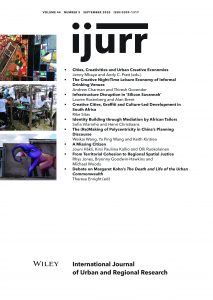In contemporary African cities, dressing well and wearing exclusive garments has become crucial for people in search of identity, distinction and individuality. The research presented in this article, situated at disciplinary intersections of cultural studies, fashion practices and sustainability, provides a case study of African tailors conducted in Maputo and Lisbon, with a special focus on identity building of African immigrants in Portugal. However, the role of tailors in this acculturation process has been ignored in the consumption approach to creative cities. This study is therefore also a reaction to the mainly Western world of regular couture, and to ‘creative city materials’ that focus on consumption. Instead, we emphasize the importance of African tailors who de facto shape urban experiences—visually incrementing practices—that are fundamental to the comprehension of sartorial culture, while we also allude to the complex intersections between local and global markets. In the first part of this article we describe a semi‐ethnographic study among tailors in Maputo and Lisbon. The second part presents a participatory action approach that entailed developing an educational programme for African tailors where culture and creativity meet. This programme empowered tailors to tap into their cultural knowledge on tailoring and their awareness of community identity. In our study we argue that the idea of creative cities and their creative economy should be approached from a cultural perspective, by building awareness of the importance of local creative classes instead of focusing on importing those classes.
Details
Written by:
Sofia Vilarinho & Henri Christiaans
Digital Object Identifier (DOI)
10.1111/1468-2427.12893
About DOI

